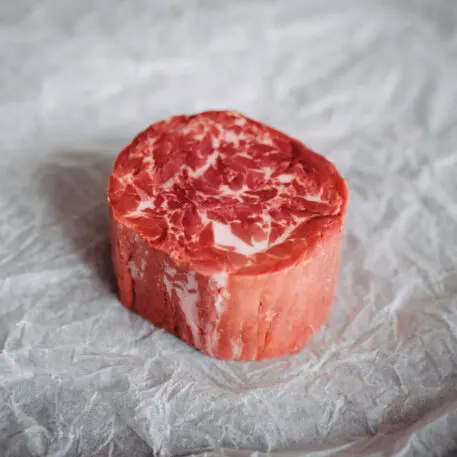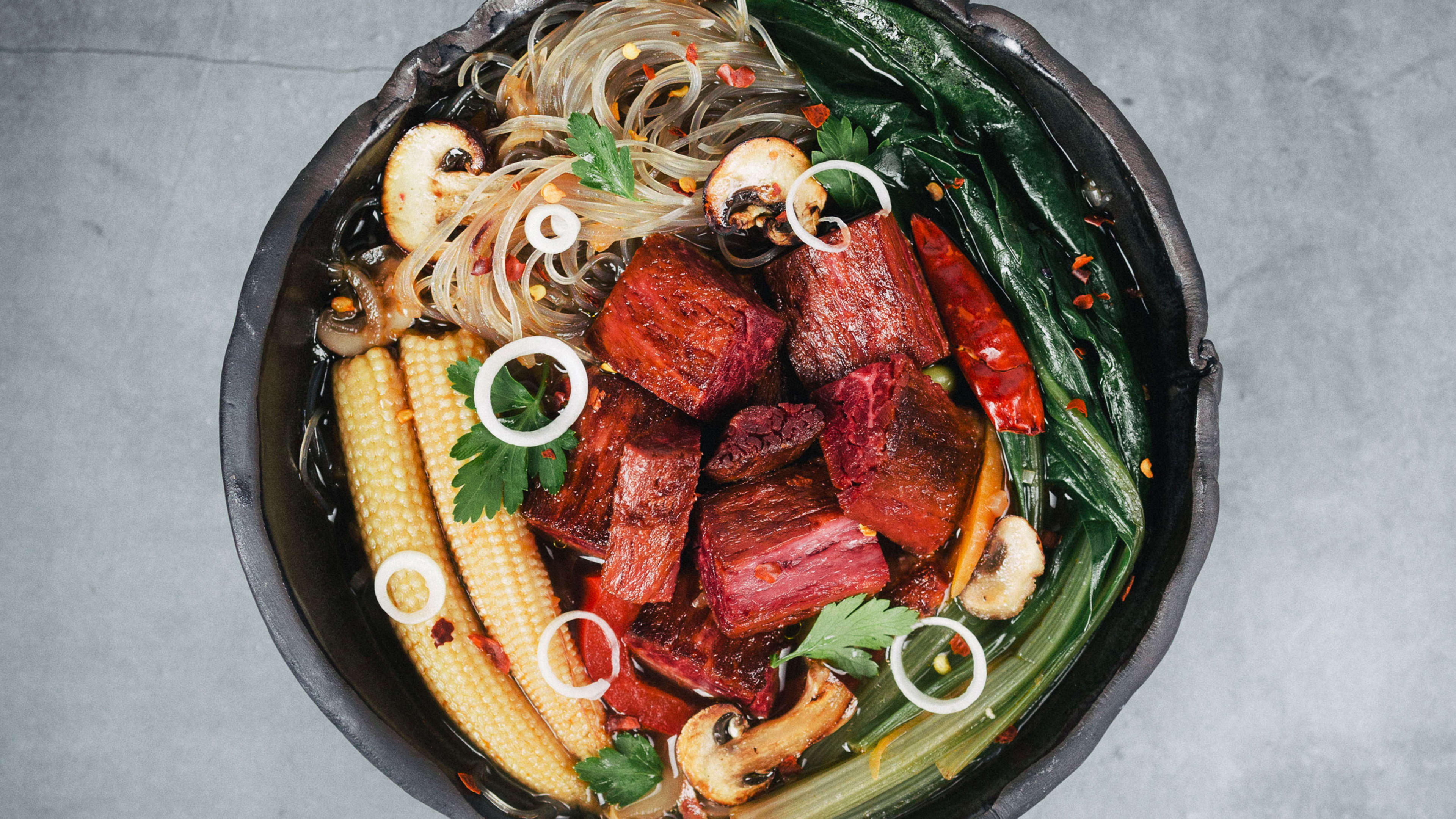“I’m not good on the spot,” says Vladimir Mićković, at the very end of our Zoom conversation about his company—when, out of the blue, he offers to sing for me. Who was I to deny him? He proceeds to reel off a catchy melody, the 1970s hit “Brandy,” by the classic rock band Looking Glass.
As Mićković launches into his falsetto—What a good wife you would be!—it is hard to buy his modest claim. He is very good on the spot. He’s frank and forthcoming about almost every aspect of Juicy Marbles, the Slovenian-based company he cofounded, which produces plant-based steaks. The Juicy Marbles website copy is similarly confident and forthcoming of its product and people, referring to the former as “the Salvador Dalí of meats” (because of how surreal the faux meats seem) and the latter, “protein-poets, trying to write a fresh verse in a weird-ass food system.”
Poets or not, the people behind Juicy Marbles are not making any old cuts of steaks, but the crème de la crème: the filet mignon. In a world of largely plant-based burgers and sausages, Mićković wants to put a premium steak on the same accessible level, transforming filet mignon into an everyday entree for the average home cook.

Here’s what we do know: It all starts with a “goo of protein,” in this case mainly soy protein, the same isolate used in the Impossible Burger and similar brands. The protein is mixed with oils, thickeners, beetroot coloring, and flavors, and goes through a patent-pending 3D assembly process that uses pressure and heat to produce the final filet. All Mićković reveals about their machine is that it’s the size of a room—and that they call it the Meat-O-Matic 9000. Here’s how the website cheekily describes it: “With the power of thunder and universal love, we forged a massive machine in the depths of lush forests within the country which gave birth to Luka Dončič and Melania Trump.”

Seared on a hot, wispy pan, it quickly forms a delectable crust, while staying soft enough on the inside. That said, there’s probably less of a difference between medium-rare and well-done preparations compared to a beef steak. But the biggest distinction I found was that, if you’re used to beef drippings oozing out, ready to form the base of a sauce or gravy, or fat for roasted potatoes, that’s largely absent here. I tried to make a red wine and shallot reduction, which was pleasing enough but lacked the richness of beef fat. Mićković acknowledges that they want to keep working to get the product to melt more.

So, who is making filet mignon on a regular night in? And if it’s a special-occasion splurge, aren’t people just going to go for the real thing? Perhaps, Mićković concedes, but the company’s aim is to make it more than just a birthday or anniversary treat. “I definitely decimate the thing,” he says, describing how he slices his filet mignon into chunks and slices, putting it in sandwiches, ramens, even bourguignons, creating potential blasphemy to steak purists. Customers can pay 30 euros (about $33.60) for four 113-gram (4-ounce) steaks—which is about half the price of the real thing, and Mićković expects the cost to come down.

They’re taking their time because, for now, the company wants to get the look and taste right. Juicy Marbles’ prime customer is the flexitarian or reducetarian crowd—carnivores who want to cut down on meat, more than hardline vegetarians or vegans. Still, Mićković envisions a time when it won’t matter as much if it tastes like beef or not. “Sooner rather than later, most people are going to stop caring, and just wanting something that’s delicious,” he predicts.
But he has a personal, and often overlooked, reason for spreading the plant-based word; what he calls the humanitarian crisis. This is when Mićković gets most vulnerable, shaking off any pretense of Muskian facade. “Why I believe that protein diversity is important,” he says, “is because the food system, as is, is not feeding people.” There are an estimated 2.3 billion people in the world without food security, and 690 million malnourished. Globally, humans feed more than a third of the world’s crops to livestock. “It is completely an irrational way of dealing with natural resources,” he says.
Mićković thinks this might be the route to get people to embrace plant-based diets. And he knows that, just like with vaccine uptake, the messaging is crucial. In a Medium post, he details his reasons for getting vaccinated, expressing a strong belief in science but arguing that it’s not helpful to demonize those with doubts. And he takes a similar approach to food. “If people don’t think animals are sentient, or if climate change is real, at least I think we can all agree that humans are sentient and real,” he says. “I hope that that would nudge people to be more protein-curious.”
It’s at that point, expressing his sincerest sentiments, that he claims bashfulness and offers up his vocal cords. And now that I think about it, was the song, “Brandy,” a subliminal hint that perhaps a brandy sauce could complement one of his steaks, instead of my red wine concoction? Maybe next time, with the arrival of the brand’s melty, juicy, fat-flecked ribeye.
Recognize your brand’s excellence by applying to this year’s Brands That Matter Awards before the final deadline, June 7.
Sign up for Brands That Matter notifications here.
